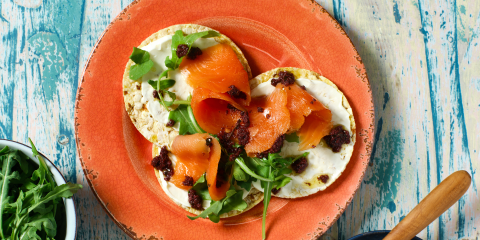5 Reasons Why Protein Matters for Women

Life can be hectic and getting enough time to eat can be a challenge in a life with a to-do list that seems never ending. One important reason to eat and in regular intervals is for your body to get enough protein it needs.
Protein is needed to make and repair every cell in your body. If you are not getting enough of this macronutrient your body will not be able to function at its best. Some signs and symptoms of not getting enough protein could be having brittle nails and hair and your immune system cannot function optimally.
5 Important Reasons Women Need Protein
Maintaining A Healthy Weight
Protein is a macronutrient which helps you feel fuller for longer. It also has the highest amount of energy your body needs to use and create energy from it, called the thermic effect of food. This means that when you add protein to a meal or a snack it helps to keep your blood sugars lower and give you more sustained energy. This can help you to achieve and maintain a healthy weight.
Putting Your Best Hair, Skin and Nails Forward
Protein is needed to make all the cells in your body including your skin, hair and nails. When you don’t get enough protein, your nails may get brittle, and break and your hair also breaks and becomes limp. The health of your skin is also affected as collagen, which gives your skin the healthy bounce and plumpness is lacking.
Staying Strong
Your muscles need enough protein each day to be maintained in your body. Without enough protein your muscles ultimately waste away. As we age the need for more protein increases further as your body gets less effective at using protein. This why after the age of sixty five years your protein requirements increase. Having enough muscle is important for function as well as bone health. Your muscles pull on bones when you move and help to stimulate the bone building cells or osteoblasts to maintain and keep your bones strong. As a result, you are less likely to develop osteoporosis.
Gut Health
For your gut to function optimally it needs a healthy gut lining. This lining is important not only to help transfer substances it should but also keep compounds out. Without enough protein your gut lining becomes more prone to letting the things you want out of your body through. This can lead to leaky gut symptoms such as increased inflammation.
Keeping Your Hormones in Check
Protein is needed to make your hormones. This includes oestrogen, progesterone and thyroid hormones. Another important hormone that protein helps to make is insulin, this hormone helps to take the sugar out of your blood into the cells of your body. Increased insulin can lead to insulin resistance and is a common symptom of polycystic ovarian syndrome. Having optimal insulin sensitivity in your body is also important for fertility and to maintain enough energy for you to get through your day feeling good.
Life Tips To Get Enough Protein
Eating enough protein and in regular intervals is the best way for your body to keep receiving the protein it needs. Aiming for between 20-40g of protein in each meal and 15g in each snack is a smart strategy. If you eat every 3-4 hours with the amounts listed above, this should easily keep your protein needs met.
Here are some examples of common foods and the protein your body will receive:
• 65g of beef, pork or lamb or 80g chicken = approximately 20-25g protein
• 30g nuts, seeds and nut/seed butters- almond/peanut butter (be mindful you should only have 10-15 whole nuts or 1-2 tablespoons maximum) = approximately 10-15g protein
• 1 large egg = approximately 7g protein
• 100g tuna = approximately 30g protein
• 2 slices of cheese = approximately 10g protein
• ½ cup of oats = approximately 7g protein
• 1 cup cooked quinoa = approximately 8g protein
• 100g hard tofu = 12-15g protein
• 100g yoghurt = approximately 10g protein
• 2 slices whole grain bread = approximately 12g protein
• 1 tablespoon peanut butter = approximately 6g protein
• 6 Corn Thins slices (a serve of wholegrains) = 4g protein
Take home message: Keep your body thriving by eating a diet which meets your protein needs. Taking the time to slow down and eat will also help you to keep up with your life and meet your daily to-do list with much more enjoyment and energy.
References:
- Jäger R, Kerksick CM, Campbell BI, Cribb PJ, Wells SD, Skwiat TM, Purpura M, Ziegenfuss TN, Ferrando AA, Arent SM, Smith-Ryan AE, Stout JR, Arciero PJ, Ormsbee MJ, Taylor LW, Wilborn CD, Kalman DS, Kreider RB, Willoughby DS, Hoffman JR, Krzykowski JL, Antonio J. International Society of Sports Nutrition Position Stand: protein and exercise. J Int Soc Sports Nutr. 2017 Jun 20;14:20. doi: 10.1186/s12970-017-0177-8. PMID: 28642676; PMCID: PMC5477153.
- Baum JI, Kim IY, Wolfe RR. Protein Consumption and the Elderly: What Is the Optimal Level of Intake? Nutrients. 2016 Jun 8;8(6):359. doi: 10.3390/nu8060359. PMID: 27338461; PMCID: PMC4924200.
- Nowson C, O'Connell S. Protein Requirements and Recommendations for Older People: A Review. Nutrients. 2015 Aug 14;7(8):6874-99. doi: 10.3390/nu7085311. PMID: 26287239; PMCID: PMC4555150.